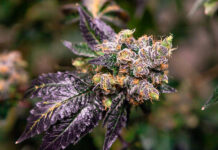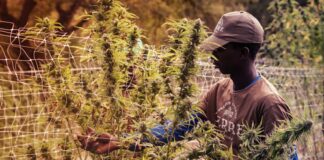
When industrial hemp production became legal following the passage of the 2018 Farm Bill, the measure planted the seed of great hopes for a new line of hemp-based businesses.
Farmers and retailers alike had virtually no time to rejoice before regulatory confusion shut down their ambitions — and sometimes their businesses, as plans for a lucrative new cash crop have been put on hold.
Shop and restaurant owners in several states are being obliged to pack up their merchandise containing cannabidiol (CBD) until it’s out of the crosshairs of regulators who are interpreting state and federal laws.
Although CBD seemed to be everywhere in fall 2018 when it turned up as a boutique item at restaurants and as an ice cream additive, some state authorities didn’t find it so tasty.
The turmoil soon led to what is now being called the “CBD crackdown,” and it’s spreading from state to state as the hottest health and wellness product of the latter half of 2018 seems to have hit a roadblock.
For example, the Los Angeles County Health Department announced in January 2019 that hempseed and hemp oil were approved as food products, but CBD oil from hemp was not.
Health inspectors in Maine followed suit, leading to concerns that the state’s fast-growing hemp industry could be derailed.
In North Carolina, businesses received warning letters to stop selling CBD-infused products.
Authorities in New York and Ohio issued no such warnings when they came calling.
“The inspector arrived out of the blue and said, ‘Take the signs down and pack up the merchandise right now,’” said Debbie Gannaway, owner of Gramma Debbie’s Kitchen located in Cincinnati‘s historic Findlay Market and is also seen weekly on Cincinnati CBS affiliate WKRC-TV sharing her culinary tips and recipes.
“Can you imagine the TV cameras if the police came and took Gramma Debbie away for selling CBD seltzer?” said Gannaway, a grandmother of 10.
New York Health Department officials also caught retailers off guard in a series of unannounced inspections.
Dorothy Stepnowska, the owner of Flower Power Coffee House in Queens, echoed a common concern of CBD sellers. “I was waiting for them to regulate it, give us some kind of instructions, not for them to just pull it off the shelf,” she told the New York Post.
At least one CBD advocate agreed with the health authorities.
“What would happen if a restaurant puts CBD into someone’s food and they have a bad reaction?” asked Steve Phan, co-founder of Manhattan-based Come Back Daily, which sells CBD-infused packaged food, tinctures, and balms.
A sign outside a luggage store in New York’s Chinatown describes CBD products for sale. (Photo by Maureen Meehan)
How did this happen?
The possibility that CBD would be legalized nationwide looked almost inevitable in June 2018 when the Food and Drug Administration (FDA) approved the first — and so far only — cannabis-derived medication, Epidiolex, which was developed to treat severe forms of epilepsy.
Not long after that, in September 2018 the Drug Enforcement Administration (DEA) spurred more excitement with an announcement that FDA-approved drugs with less than 0.1 percent THC would be moved to Schedule V, a classification for drugs with a lower potential for abuse and minor health risks.
The decision freed CBD from its 49-year designation as a Schedule I drug, which had classified it as having “no accepted medical use and a high potential for abuse.”
Enter hemp, which, according to the federal definition, must contain less than 0.3 percent THC.
Prior to the 2018 Farm Bill that reclassified hemp as an agricultural commodity, individual states had different rules on the books about hemp. Some completely banned it while other states allowed for research and pilot projects.
Previously, federal law did not differentiate hemp from other cannabis plants. Under the Federal Controlled Substances Act (CSA), they were all illegal even though CBD does not produce a psychoactive effect.
With the 2018 Farm Bill legalizing hemp, cultivators from upstate New York to the Kentucky hill country to Colorado viewed the move as a bright spot for their depressed rural economies and low commodity prices. Now, like everyone else, they will have to wait for clarification.
Adding to the confusion?
Shortly after the signing of the Farm Bill in December 2018, the FDA reiterated that it would treat CBD the same for regulatory purposes regardless of whether it comes from the hemp or marijuana plant. The FDA also prohibited the sale of products containing CBD as dietary supplements.
A luggage store in New York’s Chinatown advertises CBD products. (Photo by Maureen Meehan)
“As far as the legality of CBD, there is no real clarity on what stance the FDA is going to take,” said Erica McBride Stark, executive director of the National Hemp Association. “In the meantime, we’re left navigating the best we can.”
“Navigating,” at least in hemp, is precisely the problem for some.
Drivers bringing hemp across state lines still have reason to be worried, as two recent cases illustrate.
In Pawhuska, Oklahoma, four men were arrested for hauling approximately 9 tons, or more than 8,100 kilograms of what police contended was marijuana, from Kentucky to Colorado. Two security guards in the truck posted bond after one week but the two drivers, unable to make bail, spent one month in jail until they were released on their own recognizance on Feb. 8, 2019.
Their lawyer said the shipment in the truck was hemp, not marijuana. Prosecutors argued the opposite. The drivers, African natives for whom English is their second language, said they didn’t know what they were hauling.
Lab results released three weeks after their arrest showed that most samples of the product tested near or just slightly above the legal limit for hemp.
In another case, an Idaho trooper stopped a truck driver at a weigh station in late January 2019 and found nearly 7,000 pounds of what he thought was marijuana. The truck’s bill of lading listed the goods as hemp.
DEA Special Agent and spokesperson Melvin Patterson, called the Oklahoma case “odd because local police are not supposed to arrest someone on the spot” without testing the product first.
“There’s no way the police could have known the amount of THC in the product the truck drivers were hauling,” Patterson said. “It’s a murky situation.”
U.S. Postal Service Litigates
Two companies found themselves in complicated situations when they had their shipments of hemp-derived CBD confiscated by the U.S. Postal Service (USPS). Both of their cases have established legal precedents.
An Upper West Side Manhattan health food store advertises CBD products. (Photo by Maureen Meehan)
In January 2018, the USPS seized a package containing 1.17 kilograms of CBD powder mailed to a Utah address by KAB LLC, a registered Colorado industrial hemp cultivator. When the company’s attorney, Courtney Moran, argued that KAB had used industrial hemp to create the CBD powder, the judge agreed.
Administrative Law Judge James G. Gilbert ruled on Sept. 21, 2018, that KAB was in compliance with the 2014 Farm Bill that legalized the cultivation of industrial hemp for research purposes and that therefore CBD products made from industrial hemp were legally mailable.
Later in the year, the USPS confiscated a 22-pound package of hemp-derived crude CBD oil sent to Ohio by Matt Enos, CEO and founder of Oregon-based Pataganja, Inc. Enos also won his claim that the hemp-derived product was not a controlled substance, and the seized package was returned.
“This was a big win for Pataganja and KAB as we fight for our rights as consumers and as an industry,” said Enos. “We are the first case of shipping CBD crude oil to win an appeal and the last to go through right before the 2018 Farm Bill passed. Exciting times.”















